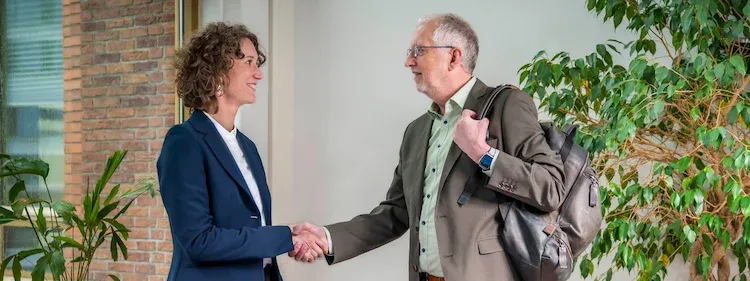Finance is the key to innovation and growth for innovative entrepreneurs. Want to know how protecting your intellectual property (IP) significantly increases your chances of success? Take advantage of Octrooicentrum Nederland's tips: find out how to conduct an effective patent search and learn from the experiences of other entrepreneurs.

Forms of financing
.As an innovative entrepreneur, you want to develop your product or service as well as market it so that your business grows. To do this, you may knock on the bank's door for a traditional loan. But did you know there are other ways to finance your innovative product or service? Ways like grants and schemes, crowdfunding or by attracting investors. It depends on your business, idea or product which form suits you. If you make sure you are well prepared which means you know the funding options, well then you will have a better chance of succeeding in finding capital.
Do you want to attract the attention of investors? Then recording your own intellectual property and researching existing patents is often very important. How important depends very much on your industry, type of company and the investor you want to attract. Some investors will ask more questions about intellectual property than others.
Discover our 5 tips that will increase your chances of getting funded.
Tip 1: Explore all protection options
As an entrepreneur, you record your invention with a patent (also called a patent) so you can stop counterfeiting. But there are also other ways to protect your ideas:
- Patent law: for technical products or production processes.
- Copyright: for creative work such as texts, and images and source code of software.
- Trademark law: for logos, words (names) of companies, products and services.
- Trademark law: for the name of a company.
Tip 2: Protect your intellectual property in time
It is often smart to think about intellectual property early on in your innovation journey. This is also apparent from research by the European Patent Office (EPO) and the European Union Intellectual Property Office (EUIPO). Start-ups that apply for a patent or other form of intellectual property right (IP right) early on are up to 10 times more likely to receive funding than start-ups that do not.
Practice example
.Start-up Weco (the Wave Energy Collective) is developing innovative solutions to produce electricity from ocean waves. The company is very aware of the importance of protecting their invention, including for attracting investors. Weco now has 2 patents.
Tip 3: Don't reveal the technique too quickly
Novelty is a requirement for a strong patent. So the technique you want to protect with a patent must not have been disclosed earlier than the date of your patent application. Not even by yourself. Therefore, be careful what information you disclose to others. For example, in joint R&D with other parties, discussions with investors or crowdfunding.
Crowdfunding is a way to raise money from the general public (the crowd). This is often done through online crowdfunding platforms, where people can invest in different projects or initiatives. This way, you get funding directly, without having to go to banks or apply for grants. Still, it is important to pay close attention when using crowdfunding. This is also the experience of keyboard developer Wooting.
Tip 4: Make timely agreements when working together
Many innovations arise in partnerships. But for investors, it is often desirable that your intellectual property is well delineated or even better: that your company is the sole owner of essential intellectual property. This is why this point deserves the attention from the outset of a collaboration. Prior to the collaboration, record the background knowledge of the parties: this is the knowledge obtained beforehand or outside the collaboration. So that knowledge does not count as knowledge that falls under joint development.
Make clear agreements in advance about the intellectual property of the knowledge acquired in the collaboration. This is the foreground knowledge: all knowledge and intellectual property built up in the context of the collaboration. In addition to it being important to know who becomes the owner, you also determine who gets access to the foreground knowledge and what conditions apply.
Tip 5: Investigate whether you are infringing on the intellectual property of others
Freedom-to-operate (FTO) means being able to market your product or service without infringing on the intellectual property of others. Find out by having an FTO study done. This is also of interest to investors because they want to keep their risk as low as possible.
Follow a workshop on intellectual property
.RVO often organizes events, workshops and webinars throughout the country and in cooperation with various partners. View the calendar for the overview and register right away.